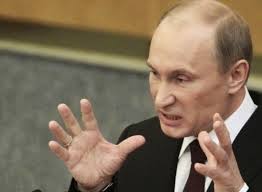Drew Harwell
An international resistance of computer programmers and volunteer “information warriors” is racing to pierce Kremlin propaganda and expose ordinary Russians to the uncensored truth of a brutal war.
They’ve built tools that allow anyone to surprise Russian citizens with text messages detailing the war’s civilian death toll. They’ve published antiwar videos and news sites built to evade Russian government bans. They’ve even cobbled together databases with the personal details of Russian military personnel – all in the hopes of fomenting rebellion across the new Iron Curtain.
Since the days of the Cold War, when U.S.-government-funded stations such as Radio Free Europe broadcast anti-communist messaging across the airwaves of Soviet states, the West has tried, often futilely, to pierce the propaganda bubble that surrounds and isolates the Russian populace.
But the Internet has sent those information-war efforts into overdrive, allowing everyday people to pitch in on imaginative efforts designed to reach strangers thousands of miles away.
The volunteers behind today’s efforts say they hope to help overcome the Russian government’s suppression of the war’s devastated cities, bombed hospitals and humanitarian catastrophes. The human rights group OVD-Info says thousands of Russians have been arrested in antiwar protests since the invasion began.
How coverage of Ukrainian refugees is different from other conflicts

But some of the initiatives also could backfire due to their reliance on the personal data of Russians, many of whom are disconnected from the war effort and face grave risks for public protest. They could also prove ineffective due to the force and speed with which the Kremlin has worked to sever millions of Russians from the open Internet.
The Russian government, decrying Western censorship, has blocked or restricted access to the social networks Facebook, Twitter and Instagram; the websites of publicly funded broadcasters such as the United Kingdom’s BBC, Germany’s Deutsche Welle and the United States’ Radio Free Europe/Radio Liberty and Voice of America; and independent news sites appealing to Russian audiences.
A new “fake news” law signed by Russian President Vladimir Putin has threatened 15 years in prison for journalists who contradict state propaganda, including by calling the war a war, leading The Washington Post and other news organizations to pause reporting inside the country. Popular independent TV and radio outlets in Russia have been shut down or banned.
But the Internet has helped reveal how porous such traditional blockades can be – and how quickly political messages can spread. After a Russian state TV producer named Marina Ovsyannikova burst onto a government news broadcast with a “No War” sign, the moment went viral almost immediately on the Russian Internet, and her Facebook page exploded with thousands of celebratory comments, some of which were in Russian.
In a video message posted to Telegram before her arrest – which has since been widely copied and shared – she said, “I am ashamed that I’ve allowed the lies to be said on the TV screens . . . that I let the Russian people be zombified.” Meduza, an independent Russian-language news site recently banned by Russia, reported on Tuesday that employees at Ovsyannikova’s state-run network routinely watch Western news to understand the war.
Ukrainian President Volodymyr Zelensky has recorded videos appealing directly to citizens of the country invading his own, saying in Russian, “As long as your country has not completely closed itself off from the whole world, turning into a very large North Korea, you must fight.”
Ukrainian officials have promoted highly produced videos attempting to drive home the visceral shock of war. They also run a Telegram channel showing videos of killed or captured Russian soldiers as a way to alert their family members and stoke anti-military anger back home.
Social media companies and media outlets in the West have also started helping Russians circumvent that censorship by using the special software Tor, which routes Internet traffic through a scattered network of servers, effectively neutralizing the website blockade.
The BBC, Deutsche Welle and Twitter have published links to their Tor sites – accessible with a free browser – as well as Russian-language guides on how to view them. Some were first launched on the “dark web” years ago but were used only sparingly before the war.
“Our mission is to maintain a dialogue with the people of Russia,” Peter Limbourg, a director at Deutsche Welle, wrote in one reader guide. “A dialogue sometimes also includes unpleasant truths.”
VPN – or virtual private network – apps, which allow Russians to access otherwise-banned sites, have been downloaded millions of times in recent weeks on the Apple and Google app stores, market research data shows.
And internal data from Tor, which began as a U.S. government project but now operates as a nonprofit, shows that use of the system inside Russia has soared, with thousands more computers connecting to its network since the invasion began.
The U.S. government has also sought to protect the continued presence of companies such as Cloudflare, a cybersecurity company used by much of the Internet to keep their websites online. The company has faced calls to drop sites that echo Kremlin propaganda, but it has resisted due to concerns that could lead to its other clients – including independent media reaching Russians – falling offline, too.
The State Department has supported them in that balancing act, with a spokesperson telling The Washington Post, “It is critical to maintain the flow of information to the people of Russia to the fullest extent possible.”
The New York Times and The Post have launched channels on Telegram, the uncensored group-chat service popular in Russia, and made some war coverage free to access in Russia and Ukraine.
The BBC, which also uses Telegram, says traffic to its Russian-language digital platforms has exploded, including breaking a record of nearly 17 million people in the first week of the war. But the British news giant has also turned to one of media’s earliest marvels, shortwave radio, to reach Russian listeners, saying this month it would start broadcasting on new frequencies that “can be received clearly in Kyiv and parts of Russia.”
Four hours of daily news reports are now broadcast in the early evening and just before midnight Ukraine time on the frequencies of 15735 kHz and 5875 kHz, the BBC said. In one of the BBC World Service’s first shortwave broadcasts, in 1932, King George V said it would connect those throughout the British Empire “so cut off by the snow, the desert or the sea that only voices out of the air can reach them.” Its last shortwave broadcast before the Ukraine war was in 2008.
The U.S. Agency for Global Media, which runs Voice of America and Radio Free Europe/Radio Liberty, is not transmitting over shortwave. But the owners of a shortwave station in Okeechobee, Fla., whose radio antennas tower over a cow pasture, told reporters that they have started beaming Voice of America broadcasts over the airwaves to Russia. (An online fundraiser for the operation has raised more than $12,000.)
Thomas Kent, a former president of Radio Free Europe/Radio Liberty, wrote in an essay last week that Western strategists should consider more imaginative options for fomenting internal dissent in Russia, including organizing campaigns to email audio files, holding closed discussions on small social networks and smuggling flash drives.
“Kremlin leaders cannot eternally ignore public discontent, even if they are willing for now to brutalize anyone who dares protest in the streets,” Kent wrote. “The Western world must demonstrate it respects Russia’s population, even if the regime doesn’t. That means showing commitment to the principle that Russians deserve to be informed.”
Radio Free Europe/Radio Liberty and the BBC say they’ve seen audiences for their Russian-language offerings grow dramatically since Russia’s invasion and crackdown on independent media.
The RFE/RL website saw its number of unique visitors from Russia spike by 86% in the first two weeks of the war; on YouTube, many of its latest videos have surpassed 1 million views. People are also evading Russian censors by sending the stories over Telegram and email newsletters, said Jamie Fly, president and chief executive of RFE/RL.
“Certainly it is becoming more difficult if you are Russian sitting inside Russia to get independent news and information, but people are still looking to that content, whether they’re using VPNs or mirror sites,” Fly said. “As we saw throughout the Cold War, in a variety of countries, people always find a way no matter what the jamming tactics are.”
Beyond the official efforts, teams of computer programmers have also begun striking out to stir up Russian rage. One group, squad303, named for an air squadron that tore through Nazi warplanes during World War II, has built a website that shows a randomly selected Russian citizen’s email address, phone or WhatsApp number – as well as a pre-written message a visitor can send to strike up a conversation from their own accounts.
“Hello, my Russian friend,” one text says, roughly translated. “We don’t know each other. I live abroad. I know that Russia invaded Ukraine and many soldiers and civilians died there. How do you live in Russia? How is it going?”
One of the group’s programmers in Poland – using the name of Jan Zumbach, one of the squadron’s ace fighter pilots – said he now works alongside more than 100 volunteers from Estonia, France, Germany, the United States and other countries, broken into teams devoted to software development, cyberdefense, social media and a “help desk” to get new messengers onboard.
Millions of messages, some of which have showed photos of the war or tallies of civilian deaths, have been sent in less than two weeks to the Russian numbers, according to the programmer, who said their database includes tens of millions of phone numbers and email addresses taken from hacked Russian databases. The team has raced to expand its infrastructure, growing from one server earlier this month to 16 servers today. Other mass-distribution operations are currently in the works, he said.
The project is all-consuming, he said, and he’s getting about three hours of sleep a night. But he said he remembers how important outside information from Radio Free Europe was to his parents during the 1980s, when they took part in the Solidarity labor movement that shook the Soviet Union. He hopes his work today will have a similar impact.
“We do not expect instant rewards or instant replies. It’s a process,” he said. “Every single text message sent to a person in Russia is a tiny bridge between two people.”
Dey Correa, a volunteer messenger in Panama, said she has sent hundreds of messages to Russians with help from the site, including 50 while she was at home breastfeeding her infant son.
She shared screenshots with The Washington Post showing dozens of messages and conversations, including one in which a respondent said Russians were shocked by the war but afraid to protest due to police crackdowns.
Correa doesn’t know if it will have any impact, and she has worried about retaliation. But she said she felt motivated to do something when she saw photos of a devastated maternity ward in Mariupol, Ukraine.
“When I saw the hospital, it became personal,” she said. “I think how horrible the nights are for those mothers – the cold. Not all of them have the opportunity to hold their babies, like I do.”
Another group has created a search engine, called Rusleaks, that aggregates more than a dozen databases purported to feature the personal information of Russian military personnel, including tens of thousands of people’s names, addresses, phone numbers and passport details.
The data have not been fully verified and some of the records have been released by the Ukrainian government, raising the risks of false information.
But one of the group’s members, a software developer formerly in Kyiv, said the data could be used to alert the Russian public to what their government is doing or help investigate war crimes.
“I don’t know how soon it will happen. I don’t know that it will happen at all. But I am doing what I’ve been training for,” he said. “We are fighting on too many frontiers now. And this is clearly one of them. . . . Whatever it takes to make our voice louder.”
– – –
The Washington Post’s Paul Sonne contributed to this report.














